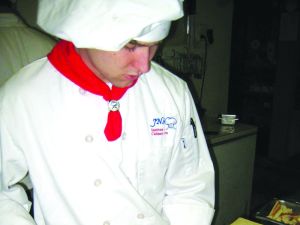
Following the pomp and circumstance tune of graduation, college is thought to be the next step: long goodbyes, multiple suitcases and books piled high.
But when tough economic times hit the country hard, people need options. Trade school has become an opportunity for many students in the Philadelphia area to further their education at affordable rates.
Trade schools, along with vocational high schools, are becoming more popular as a way to learn specific skills instead of gaining a liberal arts or professional degree.
A recent New York Times article says trade schools are, “fulfilling a vital social function, supplying job training that provides a way up the economic ladder.” Philadelphia and its surrounding suburbs are home to a variety of trade schools such as art institutes, cosmetology schools and medical institutes that allow people to study their trades in programs that allow them to join the job force sooner.
One particular trade school student is looking forward to graduating before his friends.
“Going to culinary school is less time consuming and the cost is actually realistic in my financial situation,” Michael Turk, JNA Institute of Culinary Arts student, said. “Some people think trade schools are the easy way out because they’re cheaper. I’m lucky, because I’m doing what I love and I’m not paying a heavy price.”
According to the New York Times, the average annual tuition for trade schools this year is about $14,000. Turk pays a total of $20,000 for a two-year program where students learn not only the art of cooking, but also the management of a restaurant. JNA is one of the three culinary schools in Philadelphia and is the least expensive school in the city.
“We make the tuition here affordable,” John English, director of enrollment at JNA, said. “It’s obvious we don’t spend a ton on decorations. It’s the quality of the students we have here that’s important.”
English has seen students graduate from JNA and work at a range of places from the best restaurants in Philadelphia, to nursing homes, to owning their own catering businesses.
“I don’t think people come here because it’s cheaper than college,” English said. “The people I see here aren’t looking for an easy way out. It’s their passion otherwise they wouldn’t be dedicating their time to it.”
Domenica Pillo, first year cosmetology student at PB Cosmetology Education Centre in southern New Jersey, attended Cabrini College in the fall of 2008.
“I realized I enjoyed getting my friends dolled up to go out more than I enjoyed being in the classroom,” Pillo said.
Pillo said that some of the men and women she attends school with say that the money is easy and being a hair stylist is helping them financially.
“This is my passion, though,” Pillo said. “I see myself in 10 years owning my own salon or spa.”
For mechanical student at Williamson Free School of Mechanical Trades, Rob Masorli didn’t have the financial flexibility to explore other options.
“When it comes to high pricing of school these days it’s definitely an influence to go to Williamson,” Masorli said. “My dad was out of work when I graduated and I didn’t get enough help money wise from state and federal grants.”
Although Masorli originally dreamed of going to school for architectural design, his enthusiasm for his trade has changed and he cannot wait to get out into the working world.
As for those who have followed what some would deem the traditional path to success by attending a four-year college or university, opinions of those who attend trade schools seems more accepted.
“College isn’t for everyone,” Emily Fiore, sophomore English and education major, said. “My uncle went to a technical school and now works in the physical therapy field and lives really comfortably.”
Trade school’s continue to be a faster way of continuing an education without spending the same time or money as for most colleges today.
“There’s always going to be that debate of whether going to trade school is a cop out because most of the time it’s cheaper,” Turk said. “I do it because it’s me learning what I love to do with no unnecessary classes that I don’t need. I know I’m at the right place for what I want to do someday.”


